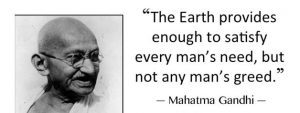Mahatma Gandhi’s concept of environmental sustainability
In Mahatma Gandhi‘s opinion, in any scheme of development, man should be at the centre. A long term view of development has to be taken, for we owe our debt to prosperity as well. Man has to make judicious use of natural resources. The ecological balance should not be disturbed.

The objective should not be to build the islands of prosperity in the ocean of poverty, but to raise the level of standard of living and to combat poverty.
Gandhi’s ideas are also reflected in the total value shift in production, consumption, habits and political systems. It places more emphasis on the moral responsibility of the individual at the personal, social, national and universal level.
Gandhi believed in community-centred approach towards sustainability emphasized on ‘betterment of human life’ and ‘ensuring fulfilment of basic needs of all human needs’.
If inward change is achieved, outward change takes care of itself.
A judicial shift from the consumer society to the Conserver Society seems to be the demand of modern age.It involves the active participation of all the members of society. Self-help, self-reliance, decentralization of industries and labour-intensive technology; these are the qualitative goals of satisfying meaningful life.
Gandhiji used the phrase, ‘Economy of Nature‘ which brings out the sensitivity and deeper understanding of human actions vis-a-vis ecology.
We need a new economic order based on Gandhi’s concept of containment of wants. Economic Philosophy based on human consideration can ensure better world order. Gandhi emphasized that the creation of wealth through fairer means and without endangering sustainable development has to be the basis of economic policy.
We need to resist unsustainable practices. Only the required amount of food should be taken as food wastage results in a generation of more methane.
Commercial considerations driven by technological advancements can trigger off a wedge between the ‘haves and have-nots’ leading to a divided world based on their economic strengths.
Change is inevitable but it is necessary to know, for what to change, to what extent to change and what could be the price to bring this change.
Time magazine in 2007 came out with 51 Global Warming Survival Guides. The 51st one is sharing more and consuming less for the simplified life. We can learn to live simply so that others can simply live. Instead of asking the question, why should I, let us ask the question, why should I not?
Source : mkgandhi.org
image courtesy:ecorama














Add Comment